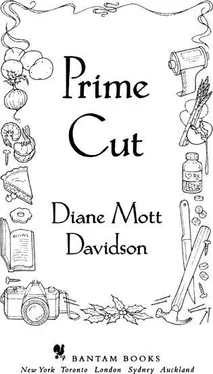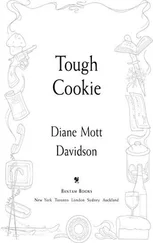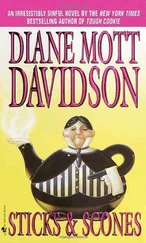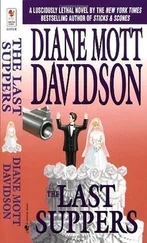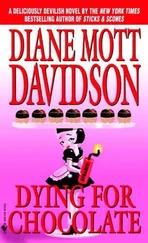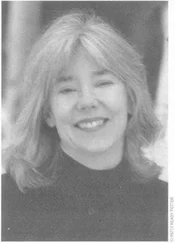Tom eyed me skeptically. “You seem awfully perky for a caterer with no kitchen, no water, and a tenuous business. You must want something wicked bad.”
“Actually, I need you to call the morgue.”
“Oh. Is that all?”
“Tom, listen. Just ask Sheila if there’s any possible evidence to show that Andre’s nitroglycerin overdose wasn’t an accident.”
Tom put down his nail gun and came over to give me a hug. “Miss G., I know you loved him. But you’re going to have to let it go.”
“If I’d been there helping him, he wouldn’t have died.”
“For crying out loud, Goldy, you know how many lives I could have saved if I just would have been someplace at the right time?”
“Please, Tom, I’ll let it go just as soon as I know how and why he died.” I reached for my van keys.
“Now where are you going?”
“Into town for coffee,” I replied innocendy.
“You’ve got that purposeful look about you that’s not just desperation for caffeine.”
Ah, how well the man knew me. “No bail was set for Cameron Burr, right? Because it’s a murder case.”
“Correct.”
“So the next event in Cameron’s life is his preliminary hearing?”
“Ye-es.”
“I need to go visit him at the jail. To talk to him about another oudaw.”

One of the marvelous additions to Aspen Meadow in the last year was one of those drive-through espresso places where you order, answer a trivia question, get a card punched, and lay out in cash the cost of an entire fast-food breakfast for a triple-shot latte. Still, a treat was a treat, I thought as I sipped the luscious, caffeine-rich drink and zoomed down to the Furman County Jail.
Visiting hours during the week were from nine to eleven in the morning and one to three in the afternoon. I arrived just after nine and still had half of my expensive coffee to savor. So I put the cup on the dash, got out pen and paper, and started to scribble the questions I needed to pose to Cameron Burr, president of the historical society, the one person in Aspen Meadow who might know enough to figure out the puzzle of Charlie Smythe. Unwritten, but first on the list, was: Would Cameron, who had not answered any of my phone calls, see me?
Hunched over my paper, my heart quickened unexpectedly when someone passed by the back of my van. I did not move, only looked up at the rearview mirror and followed the movement. The dark-haired man was smoking, walking fast. Usually visitors to the jail at this hour were attorneys. Occasionally, out-of-work family members would straggle in. The man glanced over his shoulder to determine if I was watching him. Catching my eye in the mirror, he flicked his cigarette onto the grass and sprinted to the Upscale Appetite van. A moment later, he revved his vehicle and took off in a nimbus of grit and dust.
Well, now, there was a question I wouldn’t have thought to write down.
Who at the sheriffs department—or in the jail—had just received an early-morning visit from Craig Litchfield?
Chapter 20
The desk officer, a fresh-faced fellow named Sergeant Riordan, was not someone I knew. I handed my driver’s license over the counter and announced my desire to visit Cameron Burr. Riordan nodded and cheerfully tapped an unseen keyboard.
“Do you know my husband?” I ventured. “Investigator Tom Schulz?”
“Schulz. Sure. By reputation, mostly.” Riordan handed my license back. “Why?”
“Well.” How to sound friendly instead of nosy? There wasn’t a way. “The last guy who was here? Craig Litchfield? I … we were wondering … Could you just tell me who he was visiting?”
The cheerful expression drained out of Riordan’s face. “No. No, I can’t tell you that, Mrs. Schulz.” He picked up a phone, punched buttons, and murmured. When he hung up, his warm hazel eyes had gone from friendly to flat. “You have thirty minutes with Cameron Burr, Mrs. Schulz.”

Cameron Burr’s ill-fitting orange prison suit didn’t flatter him. He looked older, thinner, and paler than he had just ten days ago at his home. He flattened his long gray hair against his scalp in a vain attempt to make it appear less mussed. The look in his bloodshot eyes was defeated, angry. With his right hand he picked up the phone.
“Cameron, I’m sorry,” I blurted out. “I had no idea—”
He rubbed his stubbly cheeks. “How’s Barbara, have you seen her?”
“I’ve called Lutheran several times. She’s still on a ventilator.” He nodded as if he knew this already. I said, “How are you?”
He sighed. “Terrible.” The bloodshot eyes turned wary. “Are you going to screw up my case by being here?”
“I hope not.” I gripped the grimy phone. Overhead, a whirring air conditioner labored unsuccessfully to keep the metallic air cool. “I’m trying to help you. You’re right, I probably shouldn’t be here, since I found Eliot’s body and I’m technically a witness. But I’m not here to talk about what I saw up at your house, which is what your attorney would prohibit us from discussing.”
“Then why are you here?”
“Please, Cameron, first … can you tell me if you were the one who just had a visit from Craig Litchfield?”
He cast a rueful glance at the painted cinderblocks lining his side of the booth. “No, he wasn’t here to visit me.”
“Do you know who he was here to visit?”
His voice turned rough. “Is that why you came up to see me, Goldy? To ask about some other caterer?”
“No, no,” I said as gently as possible. “Don’t be angry. I was just curious. Actually, I have a few history questions, and you’re the one person I think could answer them.”
“History questions?”
“Yes. About Charlie Smythe. But listen, Cameron, if you want me to leave, I will.”
His free hand splayed against the scratched glass between us. Curiosity momentarily sparked his face, followed fast by fury. “First, I have to tell you something, Goldy. That ridiculous assistant district attorney, Fuller, is a disgrace. The man should be disbarred. I didn’t kill Gerald Eliot.”
“I know.”
He hesitated. “Why do you want to know about Charlie Smythe?”
“I’m just … trying to figure out what Gerald Eliot was up to.” I took a deep breath. “Pulling out a wall in the Merciful Migrations cabin kitchen was one of Gerald Eliot’s last jobs. Have you spent much time up there?”
He shrugged, again wary. “A fair amount.”
“The Merciful Migrations people fired Eliot in July. He was killed in August, right after a number of items, including a cookbook once used in that same kitchen, were stolen from the Homestead Museum. Then last Sunday, my catering teacher, a French chef named André Hibbard, died unexpectedly after working in that same cabin kitchen.”
“I read it in the paper. You have my sympathy.”
I nodded my gratitude. Then I said, “André had asked for a photocopy of the stolen cookbook before he died.” Cameron looked confused, so I plunged on. “Hanna Klapper told me that back in July, Gerald Eliot found a rifle that had been hidden inside the kitchen cabin wall. I think the rifle belonged to Charlie Smythe.”
Cameron Burr frowned. “A rifle? Do you know it belonged to Charlie Smythe? How do you know it wasn’t hidden after he died?”
How did I know the rifle belonged to Charlie Smythe? I didn’t. I’d just assumed it, after the weapon and Charlie Smythe were put together in the same thought by Rustine. She had told Tom, Julian, and me about the weapon, then wondered if André had told you some secret he’d found out? Say, about Charlie Smythe, who used to live in the cabin? How had she happened to put the weapon and Charlie Smythe together? Good question. “Look, I don’t know when it was hidden. But Gerald Eliot told his girlfriend that he’d found, and I quote, ‘something that was going to make us rich.’”
Читать дальше
